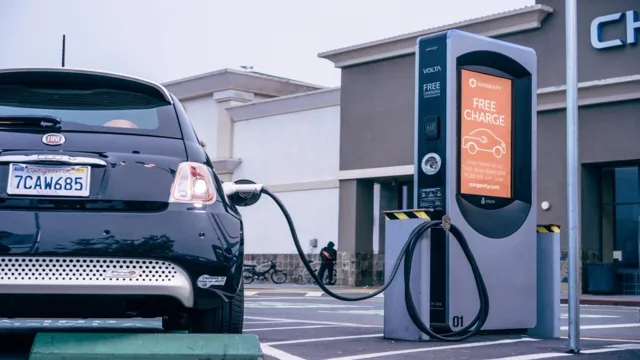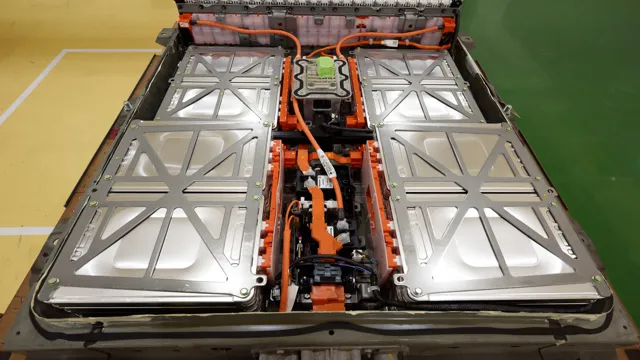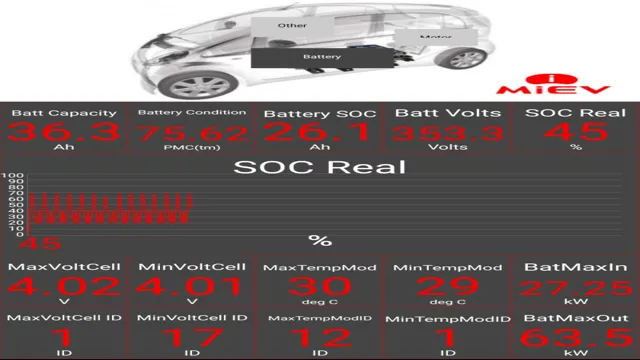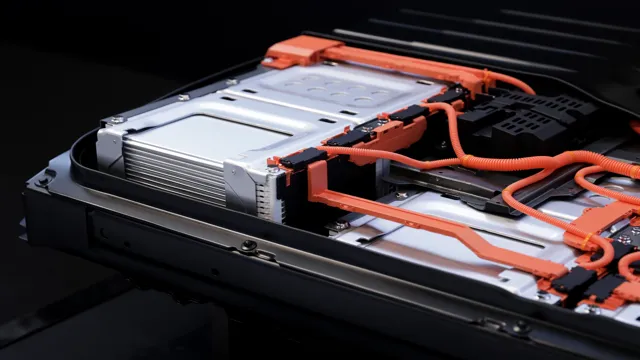Revving up the Future: Top Electric Car Battery Charging Companies to Power Your Drive
Have you recently switched to an electric car or are you thinking about it? If yes, then one of the most important things you’ll need to consider is how and where to charge your car battery. With the growing popularity of electric vehicles, there are now several companies out there offering charging services, making it easier than ever for electric car owners to keep their vehicles charged. Electric car battery charging companies have been popping up all over the country, offering various charging options for EV drivers.
Some companies offer home charging installations, where you can install a charging station at your home and charge your car overnight. Others offer public charging stations, which are convenient for those on-the-go. With so many choices out there, it’s important to research the different options before choosing the best one for you and your electric vehicle.
One of the biggest benefits of electric car battery charging companies is the convenience they provide. With more charging stations available, you don’t have to worry about running out of battery power on a long drive. Additionally, many of these companies offer apps and online services to help you locate the nearest charging station and monitor the status of your charging session.
Another benefit of using a charging company is the potential cost savings. Many companies offer competitive pricing for their charging services compared to the cost of gasoline. Some companies also offer membership plans and special deals to help you save even more on your charging expenses.
Overall, electric car battery charging companies are a great resource for EV owners. They offer convenient charging options, potential cost savings, and peace of mind knowing that you can always find a charging station when you need it. So, don’t hesitate to research the best charging companies for your electric car and enjoy the benefits of a sustainable and eco-friendly form of transportation.
Top Companies in the Market
Looking for the top electric car battery charging companies in the market? Look no further than ChargePoint, Tesla, and Blink Charging. With a mission to provide electric car owners with easy and convenient charging solutions, these companies have proven themselves as leaders in the industry. ChargePoint, for example, has over 100,000 charging stations across the globe and offers a mobile app that allows users to find and start charging on the go.
Tesla, known for its sleek electric cars, also offers its own Supercharger network with fast charging capabilities. And Blink Charging, with over 23,000 charging locations in its network, is dedicated to making EV charging accessible and affordable for all. Investing in these top companies is not just a smart move for electric vehicle owners, but also for the future of sustainable transportation.
Tesla Superchargers with 22,500 charging ports worldwide.
When it comes to electric vehicle charging, Tesla Superchargers are undoubtedly one of the biggest players in the market. With 22,500 charging ports worldwide, Tesla has created an extensive network that allows Tesla owners to easily top up their batteries on the go. However, Tesla isn’t the only company in the game – there are other major players that offer electric charging solutions.
One of these is ChargePoint, which boasts a network of over 100,000 charging ports around the world. Another player is EVgo, which has over 800 fast charging stations across North America. These companies, along with Tesla, are driving the growth of electric vehicles by providing convenient and accessible charging options.
With more and more people looking to switch to electric cars, the demand for charging infrastructure is only going to increase. Thankfully, companies like Tesla, ChargePoint, and EVgo are stepping up to the plate to meet that demand and make electric vehicle ownership more accessible for everyone.
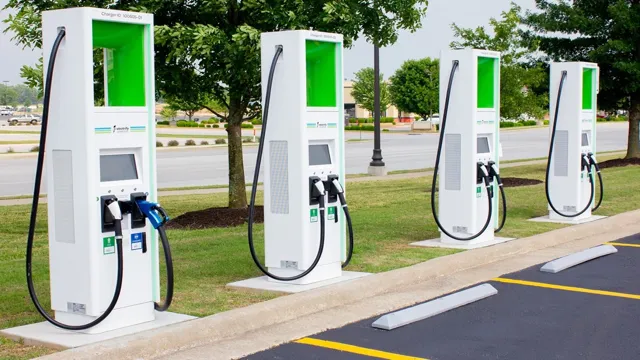
EVgo with over 800 charging locations in the US and Canada.
EVgo is one of the top companies in the electric vehicle charging market, boasting over 800 convenient charging locations throughout the United States and Canada. With a focus on fast and reliable charging, EVgo offers both Level 2 and DC fast charging. Their DC fast chargers are capable of charging up to 80% in just 30 minutes, making them an attractive option for EV drivers on the go.
EVgo has partnerships with major automakers, including Nissan, BMW, and Ford, which allows for even more seamless charging experiences for their customers. Additionally, they offer a membership program with various plans to fit different needs, including unlimited charging for a monthly fee. Overall, EVgo is a top player in the EV charging market, providing convenient and reliable charging options for electric vehicle owners across North America.
ChargePoint with over 100,000 charging points globally.
ChargePoint has established itself as one of the biggest players in the EV charging market, with over 100,000 charging points globally. Their charging stations can be found in various locations, including in businesses, homes, and public spaces. ChargePoint has been focused on expanding its reach, making EV charging accessible to more people as the demand for electric vehicles grows.
The company provides software solutions for charging station management, which allows businesses and property owners to run, monitor, and optimize their charging stations efficiently. ChargePoint has also released their own mobile application for drivers to locate and use their charging stations easily. Overall, ChargePoint has been successful in catering to the growing market demand for EV charging solutions, and we can expect the company to have further growth with the increasing adoption of electric vehicles.
Benefits of Electric Car Batteries
Electric car battery charging companies are becoming increasingly popular as more and more people switch to electric vehicles. One benefit of electric car batteries is their energy efficiency. Compared to traditional gasoline engines, which waste a lot of energy, electric car batteries are much more efficient and have a higher energy density.
This means that they can store more energy, which in turn allows for longer driving ranges and quicker acceleration. Additionally, electric car batteries are much better for the environment. They produce zero emissions, meaning that they do not contribute to air pollution or contribute to climate change.
Overall, electric car batteries are a great investment for anyone looking for a clean, efficient, and environmentally friendly way to get around.
Lower Carbon Footprint compared to gas-powered cars.
When it comes to choosing between an electric car and a gas-powered car, one of the major benefits that electric cars offer is a much lower carbon footprint. This is largely due to the fact that electric cars are powered by electricity, which is a much cleaner and more efficient energy source than fossil fuels. Additionally, electric car batteries themselves have a number of benefits when it comes to reducing emissions.
For one, they are recyclable, which means that they can be used again and again without adding more waste to landfills. They also require significantly less maintenance than gas-powered engines, meaning that they require fewer resources and create less waste in the long run. Overall, by using electric car batteries, you can help to reduce your impact on the environment and contribute to a cleaner, more sustainable future.
Lower Operating Costs with less routine maintenance
One of the biggest benefits of electric car batteries is their lower operating costs. Unlike traditional gas-powered cars that require routine maintenance, electric cars require significantly less. Because electric cars have fewer moving parts, there are fewer components that can break down or wear out over time.
This means that owners of electric cars can save a lot of money on repairs and maintenance, as well as reduce the amount of time they spend at the repair shop. Plus, since electric cars don’t have oil changes or other routine maintenance that is associated with gas-powered cars, they can also save a lot of money on their overall cost of ownership. Ultimately, this means that electric cars are a more cost-effective option in the long run.
Financial Incentives for EV ownership.
Financial incentives for EV ownership When it comes to owning an electric car, one of the main benefits is the financial incentives that can come with it. Governments around the world are offering a range of incentives to encourage people to switch to electric vehicles, and these incentives can make a significant difference in the overall cost of owning and operating an EV. In many cases, these incentives can include tax credits, rebates, and other financial incentives that can help to offset the initial cost of purchasing the vehicle.
Additionally, some countries also offer perks such as free public charging, reduced tolls, and exemptions from congestion charges, all of which can add up to substantial savings over time. With these financial incentives in place, it’s no wonder that more and more people are making the switch to electric vehicles, driving down their carbon footprint and saving money in the process.
Charging Time and Cost
Electric car battery charging companies have made great strides in reducing charging times and costs for electric cars. With new technology and advancements in battery charging, electric cars are becoming more convenient and affordable than ever before. The average time it takes to fully charge an electric car battery ranges from 30 minutes to a few hours depending on the level of charging, which can be completed at a home charging station or at a public charging station.
The cost of charging an electric car battery also varies depending on the charging method and the location of the charging station. Some electric car charging companies have introduced subscription plans that allow drivers to pay a fixed monthly fee in exchange for unlimited charging at specific charging locations. Overall, electric car battery charging companies are driving the future of sustainable transportation with affordable and convenient charging options.
Level 1 & 2 vs Level 3 Charging.
When it comes to charging your electric vehicle, there are several options available, with Level 1, Level 2, and Level 3 being the most common. Level 1 chargers use a standard household outlet and deliver around 2-5 miles of range per hour of charging. Level 2 chargers, on the other hand, provide around 10-25 miles of range per hour and require a 240-volt outlet that’s typically installed at home.
Finally, Level 3 charging, also known as DC fast charging, can deliver up to 80% of a battery’s capacity in just 30 minutes, making it the quickest option available for EV owners. The main difference between these options is the charging time and cost. While Level 1 charging may be the most convenient, it can take a long time to fully charge an EV, which may not be practical for many drivers.
Level 2 charging is faster and more efficient, but it requires an investment in a dedicated charging station and installation costs. Level 3 charging, although the most expensive option, is the fastest, making it ideal for road trips and long-distance travel. Regardless of the option you choose, the most important thing is to ensure that your EV is charged and ready to go when you need it.
Factors Affecting Charging Time.
Charging time and cost are significant factors to consider when charging electric vehicles. The charging time of an electric vehicle depends on the type of battery it uses, the charging station’s charging rate, and the current battery level of the vehicle. Charging time can range from a few hours to over a day, depending on these factors.
The cost of charging an electric vehicle also depends on the charging time and the charging station’s electricity rate. Longer charging times can result in higher electricity bills. However, some charging stations offer free charging or discounted rates during off-peak hours, reducing the overall cost of charging an electric vehicle.
As electric vehicle technology continues to progress, the charging time and cost are expected to decrease, making electric vehicles an even more attractive and practical option for drivers.
Conclusion and Future of Battery Charging
As the world continues to shift towards sustainable energy solutions, electric cars are becoming more and more popular. But with great convenience comes the need for efficient and effective charging solutions. That’s where electric car battery charging companies come in.
With their innovative technologies and commitment to green energy, they’re lighting the path towards a brighter and cleaner future. So let’s plug in and power up, because the future of driving is electric and the future is now!”
Sustainable Energy Development and Innovation.
When it comes to sustainable energy development and innovation, one of the key factors to consider is charging time and cost. With the rising popularity of electric vehicles, it’s important to ensure that the charging infrastructure is both accessible and affordable. Ideally, EV owners should be able to quickly and easily charge their vehicles at home, work, or public charging stations.
In terms of cost, the goal should be to make electric vehicle ownership comparable or even cheaper than traditional gas-powered cars. This can be achieved through government incentives, economies of scale, and advances in battery technology that allow for longer ranges and shorter charging times. By prioritizing charging time and cost, we can ensure that sustainable energy solutions remain accessible and appealing to a wider range of people and ultimately lead to a more sustainable future.
Importance of Battery Charging Networks.
As the world increasingly moves towards electric vehicles, the importance of battery charging networks cannot be overstated. Charging time and cost are two critical factors that can make or break the adoption of electric vehicles. A reliable and fast charging network ensures that electric vehicle owners can confidently travel long distances without worrying about running out of battery.
Moreover, the cost of charging must be competitive with traditional fuel options to be a viable alternative. Battery charging networks play a vital role in reducing the total cost of ownership for electric vehicles by providing affordable charging options. The availability of public charging stations can also encourage more people to switch to electric vehicles by alleviating range anxiety.
Therefore, battery charging networks must continue to expand and improve to keep up with the growing demand for electric vehicles.
FAQs
Which are the top electric car battery charging companies?
Some of the top electric car battery charging companies are Tesla, ChargePoint, EVgo, ABB, and Electrify America.
What are the different types of electric car battery charging?
There are three types of electric car battery charging: Level 1 charging, Level 2 charging, and DC Fast Charging.
How long does it take to charge an electric car battery?
The charging time of an electric car battery depends on the battery capacity, the charging station type, and the charging speed. Generally, it takes 4-8 hours for Level 2 charging and 30 minutes for DC Fast Charging.
Can electric car batteries be charged at home?
Yes, electric car batteries can be charged at home through Level 1 and Level 2 charging stations. However, DC Fast Charging requires a special charging station and professional installation.

